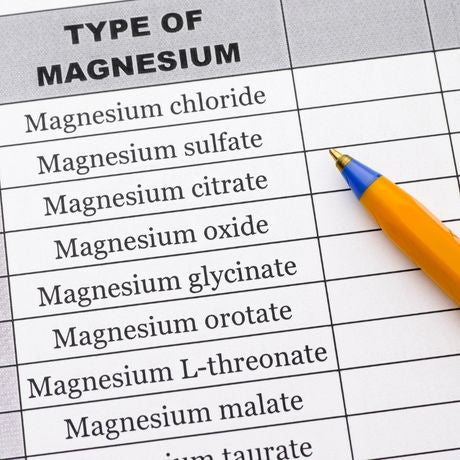You’re employed out hard. In consequence, you experience muscle pain, soreness, and fatigue. Before your next workout, those muscles have to get well. That is where magnesium is available in. This unassuming mineral could hold the important thing to alleviating muscle soreness and muscle strain and boosting workout recovery.
In this text, we explore magnesium’s ability to assist reduce muscle pain so you may determine whether you could add it to your complement regimen. Here’s what we’ll cover:
- What Is Magnesium?
- Magnesium For Muscle Pain
- Other Advantages Of Magnesium
- Foods Containing Magnesium
- The Best Magnesium For Muscle Pain And Workout Recovery
- FAQs
What Is Magnesium?
The mineral magnesium is important for a lot of biochemical reactions contained in the human body (1). One in all nutrition’s hidden heroes, it really works within the background to support our health and wellbeing. Magnesium is quickly available within the foods we eat and can be available as a complement.
Magnesium is involved in greater than 300 enzymatic processes, including regulating muscle contraction, energy production, nerve signaling, cardiovascular health, and bone strength. It has also shown itself to have the opportunity to scale back muscle soreness, enhance sleep quality, and boost post-workout recovery.
Types Of Magnesium Supplements
Magnesium supplements are available in quite a lot of forms, each with particular qualities and possible health benefits. Here, we’ll focus on the sorts of magnesium supplements incessantly consumed, but we’ll also touch on other forms, akin to bath salts and topical applications:
- Magnesium Citrate: The sort of magnesium could be very absorbable and incessantly used to boost digestive health. It is usually consumed as a complement to encourage regular bowel movements due to its mild laxative effects.
- Magnesium Glycinate: This mild and simply absorbed sort of magnesium is less more likely to upset the stomach. Individuals who want to advertise sleep and leisure incessantly select it for its calming effects.
- Magnesium Oxide: Although less accessible than certain other forms, magnesium oxide is incessantly used as an antacid to treat heartburn. It may additionally be present in some multivitamin pills.
- Magnesium Malate: The sort of magnesium is linked to malic acid. This mix can enhance the creation of energy. Individuals who want to scale back fatigue and enhance workout performance incessantly select it.
- Magnesium L-Threonate: This more moderen type of magnesium has drawn interest as a consequence of its ability to advertise mental health and cognition. It is assumed to have superior capacities to penetrate the brain.
- Magnesium Sulfate: It’s possible you’ll be more conversant in magnesium sulfate as Epsom salt. It’s incessantly utilized in baths to assuage tight muscles and calm them.
- Magnesium Aspartate: Aspartic acid is mixed with magnesium to form magnesium aspartate. This mix is believed to more effectively boost muscle function.
- Magnesium Chloride: A mix of magnesium and chlorine, this compound is an easily absorbable salt used to extend levels of magnesium within the body for things like blood pressure control and diabetes.
- Magnesium Carbonate: Often used as an antacid, magnesium carbonate can assist in balancing stomach acid. As an oral complement, it’s less popular.
- Magnesium Taurate: Taurine and magnesium are combined to create magnesium taurate. It’s occasionally chosen for its potential cardiovascular benefits.
- Magnesium Orotate: Magnesium orotate is a complement that accommodates magnesium and orotic acid and is assumed to advertise cardiovascular health and athletic performance.

Magnesium For Muscle Pain
On this section, we go deep into the specifics to learn the way magnesium for muscle pains can boost performance, help relieve delayed onset muscle soreness, and boost your workout recovery.
How Does Magnesium Help Sore Muscles?
Magnesium’s ability to bring relief to your aching muscles comes from a mix of the next aspects:
- Muscle Rest: A necessary function of magnesium is to act as a muscle relaxant. It achieves this by controlling calcium ions, that are vital for muscle contractions. By stopping excessive calcium build-up in muscle cells, magnesium promotes greater leisure.
- Anti-Inflammatory Effects: Muscle discomfort is incessantly attributable to inflammation. Magnesium possesses anti-inflammatory qualities that may aid in reducing the discomfort and swelling brought on by achy muscles. In consequence, magnesium helps the body recuperate by reducing inflammatory reactions.
- Higher Blood Flow: Magnesium helps maintain healthy blood flow, ensuring muscles get enough oxygen and nutrients. By removing waste from muscular tissues, the improved circulation aids in accelerating recovery and reducing discomfort.
- Electrolyte Balance: Magnesium is one among the electrolytes that have to be properly balanced for muscles to operate appropriately. If you work out, magnesium may be lost through sweat. Magnesium replenishment aids in maintaining this equilibrium and guards against cramps and muscle tightness.
- Nerve Activity: Nerve irritation incessantly causes muscle soreness. Magnesium helps to lower neural excitability and is crucial for correct nerve function. Magnesium can reduce pain and discomfort by calming the nervous system.
- Replenishing ATP: Magnesium is required to create adenosine triphosphate (ATP), the muscle’s energy currency. With greater energy, muscles can get well faster.
- Higher Sleep: Rest is crucial for the rehabilitation of muscles. Magnesium is thought for relaxing the nervous system and inspiring sound sleep. Your muscles can mend and regenerate themselves more efficiently with loads of sleep.
A 2022 study checked out the effect of magnesium supplementation on muscle soreness and performance amongst college-aged female and male subjects. The magnesium group took 350 mg of magnesium per day for ten days. In comparison with a placebo group, the magnesium group had significantly reduced delayed onset muscle soreness, in addition to a reduced rate of perceived exertion and improved perceived recovery (2).
How Long Does Magnesium Take To Work For Muscle Pain?
The length of time it takes for magnesium to bring muscle relief can vary quite a bit between individuals. Listed below are the important thing aspects that affect it:
- Form: The shape of magnesium you’re taking can affect how quickly it acts. While some types, akin to magnesium citrate, are rapidly absorbed and should offer relief in a short time, others, akin to magnesium oxide, are less accessible and should take longer to work.
- Dosage: The magnesium dose you’re taking is very important. Higher doses could offer more speedy relief, but adhering to suggested every day limits is critical because an excessive amount of magnesium could cause stomach discomfort.
- Individual Variation: How all and sundry’s body responds to supplements varies. While some people can feel higher in hours, others might need a couple of days to detect a difference.
- Muscle Pain Intensity: Muscle soreness or pain intensity also has an impact. Magnesium supplements may match faster to alleviate mild discomfort than on more serious muscular aches or injuries.
- Consistency: Consistency is crucial while taking magnesium supplements. Magnesium levels in your body could take a while to balance out. Thus, regular supplementation can result in improved outcomes over time.
- General Health: The speed magnesium acts depends upon your general health. It may possibly take longer to feel higher if underlying medical issues prevent magnesium from being absorbed or used properly.
- Weight-reduction plan: Your weight loss plan and hydration level can affect how much magnesium is absorbed. Supplementation could also be complemented with foods that contain magnesium. Keeping hydrated can be vital for magnesium to operate at its best.
- Stress & Sleep: Stress management and enough sleep each help magnesium work more effectively. Addressing these issues can result in quicker treatment because prolonged stress and lack of sleep can increase muscle pain.
Although most individuals begin to feel some relief from their muscle pain, keep in mind that magnesium will not be a magic bullet for severe pain or recent muscular injuries. A healthcare expert ought to be consulted for an intensive treatment plan if you may have a selected muscle injury.

Does Magnesium Help With Muscle Cramps?
Magnesium has gained acceptance as a viable natural treatment for relieving muscle cramps, and research suggests that it might be helpful in some circumstances.
To start out, magnesium is an important mineral for the health of muscles since it helps control how they contract. It does so by opposing calcium, which is vital for muscular contraction. By stopping the excessive calcium build-up in muscle cells, magnesium helps reduce the chance of cramping.
Magnesium may be lost through heavy sweating or activity, which could cause imbalances and lift the opportunity of cramping. As such, magnesium dietary supplements help reestablish the electrolyte equilibrium.
Overactive nerves can contribute to cramping within the muscles. Magnesium helps soothe nerves by stopping the production of neurotransmitters which may cause muscles to contract.
Finally, magnesium promotes healthy blood flow, ensuring muscles receive enough oxygen and nutrients. This improved circulation, especially after a workout, might lower the possibility of cramping.
Most interestingly, there’s some promising research regarding using magnesium for cramps. A 2014 study published within the American Journal of Clinical Nutrition found that supplementing with magnesium reduced the incidence of leg cramping in elderly women (3).
Anecdotal evidence also supports using magnesium for muscle cramps. Listed below are a few comments from users on Reddit:
It is crucial to notice that magnesium deficiency will not be the one reason behind muscle cramps. They can be attributable to dehydration, excess effort, and specific medical disorders.

Is Magnesium Good For Muscle Recovery Post-Workout?
Yes, magnesium can definitely help with post-workout muscle recovery in multiple way:
- Calcium Control: After an intense workout, your muscles may turn out to be tight and worn out. By controlling calcium ions, that are vital for muscular contractions, magnesium helps reduce muscle tension. This calming effect helps lessen muscle soreness and stiffness after exercise.
- Inflammation Reduction: Magnesium’s anti-inflammatory qualities will help reduce inflammation brought on by exercise, promoting recovery after your workout.
- Energy Creation: Since it is also needed to create ATP, the energy source for muscle cells, it helps provide the additional energy needed for post-workout muscle fiber repair.
- Protein Synthesis: Magnesium is a crucial element to turning DNA and RNA into proteins, which heals damaged cells and aids muscle repair, recovery, and increased muscle mass.
- Electrolyte Replenishment: Heavy exercise may also cause electrolyte losses through sweat, especially with low magnesium intake. Increasing magnesium levels after exercise aids in reestablishing electrolyte balance, reducing cramps, and preserving healthy muscle function.
- Enhanced Circulation: Magnesium promotes proper blood flow, efficiently delivering nutrients and oxygen to muscle tissues. Increased circulation helps remove metabolic waste products, lowering the opportunity of delayed onset muscular soreness (DOMS) and speeding up the healing process.
- Sleep: Magnesium also helps loosen up the nervous system to advertise quality sleep, which is an important a part of the recovery process.
Here’s what Reddit users need to say in regards to the effectiveness of magnesium post-workout:
How Much Magnesium Do You Need For Optimal Workout Recovery?
The Beneficial Dietary Allowance (RDA) for magnesium, as set by the National Institutes of Health (NIH) in the US, is as follows:
- Adult Males (19-30 years): 400 milligrams (mg) per day
- Adult Males (31 years and older): 420 mg per day
- Adult Females (19-30 years): 310 mg per day
- Adult Females (31 years and older): 320 mg per day
Beneficial dosages for athletes and lively individuals are generally higher than those for sedentary people, within the 400-600 mg range every day. That is in step with the dosages utilized in clinical trials.

Other Advantages Of Magnesium
Magnesium has many other health benefits beyond helping with workout recovery. Here’s a rundown:
- Improved Sleep: Magnesium has a chilled effect on the central nervous system, which can aid you go to sleep faster.
- Stress Reduction: Magnesium helps control neurotransmitters that affect mood. The symptoms of tension and anxiety could also be reduced, and a sense of leisure could also be encouraged by consuming enough magnesium.
- Heart Health: Magnesium helps maintain normal blood pressure levels and reduces the chance of heart arrhythmia.
- Bone Health: Supplementing with magnesium complements calcium and vitamin D in constructing strong bones.
- Digestive Tract Health: Magnesium helps keep the digestive tract’s smooth muscles working easily.
- Control of Blood Sugar: Individuals with diabetes or those in danger for developing the disease may profit from magnesium supplementation for controlling their blood sugar levels.
Foods Containing Magnesium
The next foods are excellent sources of magnesium:
- Leafy green vegetables like kale, spinach, and collard greens
- Nuts akin to almonds, peanuts and cashews
- Pumpkin, sesame, and flax seeds
- Whole greens like whole wheat, oats, quinoa and brown rice
- Avocado
- Legumes, akin to chickpeas, beans, and lentils
- Bananas
- Dark chocolate
- Salmon and mackerel fish
- Bone broth
The Best Magnesium For Muscle Pain And Workout Recovery
Magnesium is a wonderful workout recovery aid. While you may get a good amount from food, taking a every day complement is essentially the most efficient solution to get a consistent and adequate dosage.
Our favourite magnesium complement is Pure Encapsulations Magnesium Citrate. Each capsule accommodates 150 mg of magnesium citrate, one of the vital bioavailable types of magnesium. We recommend taking two capsules per day for a dosage of 300 mg.
Other FAQs
Still have questions on magnesium for muscle pain? Listed below are the answers to 4 of essentially the most common questions we get on the topic:
Is it higher to take magnesium before or after my workout?
Whether you must take your magnesium either before or after an exercise depends upon your goals. Magnesium supplements can improve hydration, energy generation, and muscle performance before exercise.
However, magnesium post-workout helps with muscle healing, replacing lost electrolytes, and inspiring higher sleep. Consider splitting your magnesium intake as much as reap the advantages of each, or speak with a healthcare skilled for advice tailored to your needs and level of exercise.
Does magnesium help muscle injury?
Yes, magnesium will help muscles get well from injury. It promotes the healing of damaged tissue, eases inflammation, and helps muscles loosen up. Magnesium also aids in reducing muscle cramping and spasms, that are frequent in sore muscles.
Magnesium supplements should, nonetheless, complement other parts of injury management, akin to rest, physical therapy, and proper nutrition, so it’s crucial to talk with a healthcare skilled for a complete treatment plan.
Is just too much magnesium bad on your muscles?
Yes, consuming an excessive amount of magnesium can harm muscles. Extremely high doses may lead to exhaustion, muscular wasting, and, in severe cases, heart issues. Before taking high-dose magnesium supplements, see a healthcare provider to make sure you stay below protected limits and avoid any antagonistic effects on muscular function.
Who shouldn’t take magnesium?
Magnesium supplementation ought to be avoided by anyone with serious kidney issues, a history of allergies to magnesium supplements, or particular medical diseases akin to myasthenia gravis.
Magnesium For Muscle Pain: Takeaways
Magnesium is crucial for promoting muscle health and recovery. As a consequence of its anti-inflammatory characteristics, function within the creation of energy, and capability to switch electrolytes, it helps to ease muscle aches, encourage leisure, and speed up recovery after exercise. As such, it’s a wise complement so as to add to your workout program
Magnesium citrate from Pure Encapsulations is a standout alternative for dietary supplements. It offers an easy approach to be sure that you meet your every day magnesium needs with 150 mg of highly absorbable magnesium citrate per capsule.






